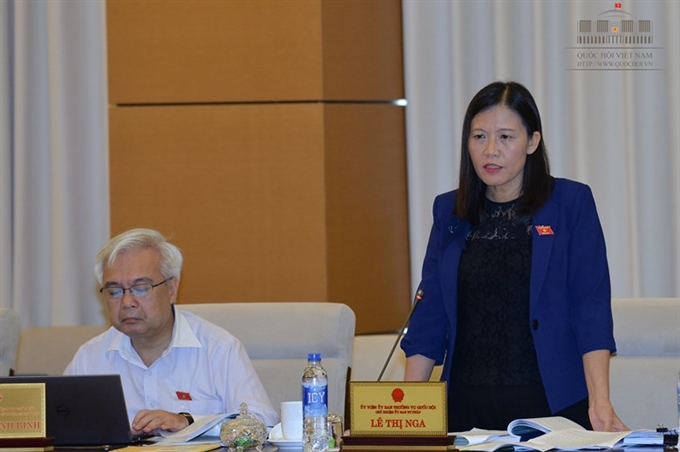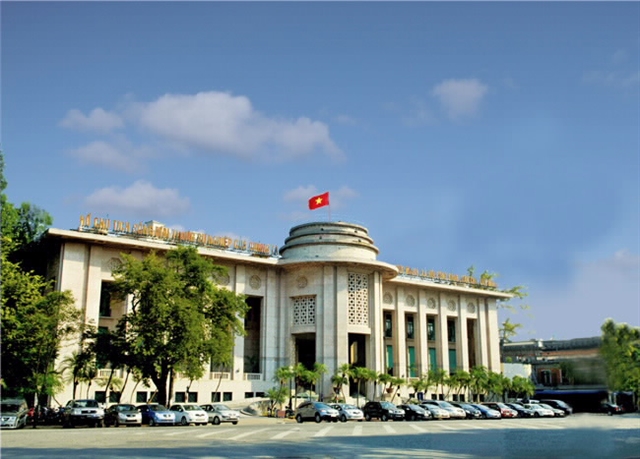 Politics & Law
Politics & Law

The Law on State Compensation Liability should clarify damages and determine the level of compensation while simplifying procedures and shorten the time of resolution.
 |
| Chairwoman of the Justice Committee, Lê Thị Nga (R) delivers speech at the third session of the 14th National Assembly yesterday.— Photo quochoi.vn |
HÀ NỘI – The Law on State Compensation Liability should clarify damages and determine the level of compensation while simplifying procedures and shorten the time of resolution.
This would raise the responsibility of officials on duty and ensure the rights and legitimate interests of affected organisations and individuals, NA deputies said at the third session of the 14th National Assembly yesterday.
Commenting on the amended Law on State Compensation Liability, Chairwoman of the Justice Committee, Lê Thị Nga, said the law was extremely difficult. The law-making process must be implemented step-by-step and take into account all the cases to ensure the rights and legitimate interests of those affected by the State’s decisions.
However, if regulations are inadequate, it would affect citizens’ rights or delay agencies proceeding.
Citing specific cases such as Lương Ngọc Phi in northern Thái Bình Province, Huỳnh Văn Nén in southern Bình Thuận Province and Nguyễn Thanh Chấn in northern Bắc Giang Province, Nga asked the drafting agencies to clarify regulations on cases that would and would not be given compensation.
Previously, there was only Decree 47 concerning compensation cases in general, and Resolution 388 on compensation for those wrongfully convicted in legal proceedings. In 2009, the Law on State Compensation Liability was issued.
Nga also said that in reports on wrongful conviction cases, agencies responsible for compensation were still acting irrationally and being slow on compensation levels. She added that there were cases that took such a long time to overturn a wrongful conviction, making a great injustice but receiving only a public apology.
Regarding claim procedures, Nga said that the law requiring invoices as a way of proving damage was not reasonable or practical, adding that those who were wrongfully convicted and put in jail and their families were miserable enough.
She also said that the public complained about the large amount of State money used for compensation, but the law did not mention the compensation responsibilities of officials on duty who made wrongful convictions.
In reply to Nga’s comments, Minister of Justice Lê Thanh Long said that he did not make sure the amended law would solve all the problems. The distance between reality and the content of the law became possible when the law was put into practice, and that law enforcement was not good enough.
In terms of calculating damages for compensation, Long said that the loss of materials was easier to calculate than that of mental damage. The drafting committee had tried to set up criteria to quantify mental damage.
On principle, all civil servants involved must pay compensation, he said, but the law would be reasonably designed to give them a sense of compensation for damages caused by them, but it would not be so horrible that civil servants did not dare do anything.
Deputy Chief Justice of the Supreme People’s Court, Tống Anh Hào, said that most cases of wrongful conviction faced slow compensation due to difficulties in identifying the agencies responsible for compensation.
Moreover, most of the victims could not prove their damages, which remained the most difficult task.
Deputy Director of the People’s Supreme Procuracy, Lê Hữu Thế, said that it was necessary to have a benchmark to calculate the level of compensation. Regulations on compensation were not clear, causing inconsistencies between compensation agencies and compensated persons.
Later the same day, NA Standing Committee members discussed the revised Law on Legal Aid.
The deputies agreed on the importance of revising the law to tackle existing shortcomings in legal aid activities and create a legal framework to make legal aid activities more professional and sustainable while effectively utilise resources when providing legal services for those in need.
Minister of Justice Lê Thành Long said the law had revealed shortcomings in the context of the issuance and adoption of many new laws and policies, as well as the new development demand of the country.
The number of people entitled to legal aid was not sufficient, he said. A number of people who have financial difficulties in paying for legal services have yet been able to get access to legal aid services to protect their legitimate rights and interests.
Legal aid activities are mixed up with other activities while many legal aid activities were of low quality, he said.
Regarding the beneficiaries of legal services, the lawmakers recommended that all people entitled to legal aid should be included in the law to ensure citizen’s rights.
Deputies also focused on the need to review practical demands, anticipate the resources for law enforcement in accordance with the country’s socio-economic situation, and ensure the regulations’ feasibility. — VNS




